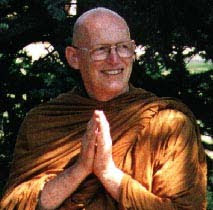 The American forest monk Ajahn Sumedho (pictured on the left) has often emphasized seeing the true nature of things and being able to say, “This is the way it is.” Without adopting a personality viewpoint, we can observe ‘the way it is’ by witnessing the body’s breathing, its posture, and just noticing how it is now, in this moment. This is the path of mindfulness, of being awake to the reality of the human form. Being alert to this body is a basic mindfulness practice taught by the Buddha back in
The American forest monk Ajahn Sumedho (pictured on the left) has often emphasized seeing the true nature of things and being able to say, “This is the way it is.” Without adopting a personality viewpoint, we can observe ‘the way it is’ by witnessing the body’s breathing, its posture, and just noticing how it is now, in this moment. This is the path of mindfulness, of being awake to the reality of the human form. Being alert to this body is a basic mindfulness practice taught by the Buddha back in Avoiding throbbing toes is but one advantage of a more aware mind: a much more profound benefit is the insight that can develop from being cognizant of our bodily movements and feelings. This insight involves the realization that the body is truly not ours; it is of nature, and is the result of natural processes, most of which are out of our control. Whilst we can direct the body to do this or that action, within natural limits of course, we cannot prevent it from ever being ill, from aging, and ultimately from dying. Watching our physical condition can open a door onto the true nature of the body, that it is impermanent, unsatisfactory, and not self (the three characteristics of existence).
The mind’s moods, whether dull or bright, happy or sad, are conditions that Ajahn Sumedho believes we can know; the empty mind, also, free from association with the myriad emotions about the self and others can be known. It can be seen to be both intelligent and compassionate. If we are willing to go through boredom, miserable feelings, and other forms of suffering, the mind will become clearer, bearing with negative mind states rather than suppressing them. Ajahn Sumedho sees this as an opportunity to recognize that this is the way that it is at this time, at this place, and by doing so, wisdom will grow.
As well as the body and mind, Ajahn Sumedho advises us to be heedful of the contents of our minds, and this too was a frequent subject for reflection in the sermons of the Buddha. Knowing each thought as it is now means that we’re less likely to drift off into unhelpful reveries that take us away from the natural ability of the mind to find solutions to the every day problems that arise in all our lives. As Ajahn Sumedho also reminds us, this doesn’t mean that we’re taking the easy option by becoming more mindful, for in doing so we will undoubtedly discover the negative states of our minds as well as the positive. But becoming more aware of such mental conditions will enable us to deal with them better, allowing an understanding to arise that can encourage us to let go of them and cultivate more beneficial psychological attitudes. And we might stub our toes less often too!
As well as the body, Ajahn Sumedho advises us to be heedful of the state of our minds, and this too was a frequent subject for reflection in the sermons of the Buddha. Knowing the mind as it is now means that we’re less likely to drift off into unhelpful reveries that take us away from the natural ability of the mind to find solutions to the every day problems that arise in all our lives. As Ajahn Sumedho also reminds us, this doesn’t mean that we’re taking the easy option by becoming more mindful, for in doing so we will undoubtedly discover the negative states of our minds as well as the positive. But becoming more aware of such mental conditions will enable us to deal with them better, allowing an understanding to arise that can encourage us to let go of them and cultivate more beneficial psychological attitudes. And we might stub our toes less often too!














0 comments:
Post a Comment